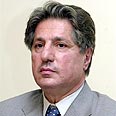Tuesday, April 03, 2007
 BEIRUT: Former President Amin Gemayel said on Monday that it was becoming increasingly likely that an international tribunal to try suspects into the murder of former Premier Rafik Hariri would be formed under Chapter 7 of the UN Charter, which would allow the tribunal to go forward even without the endorsement of the Lebanese government.
BEIRUT: Former President Amin Gemayel said on Monday that it was becoming increasingly likely that an international tribunal to try suspects into the murder of former Premier Rafik Hariri would be formed under Chapter 7 of the UN Charter, which would allow the tribunal to go forward even without the endorsement of the Lebanese government.
"Syria’s vows that it will not cooperate with the international tribunal mean that it is more than likely that it will be formed under Chapter 7, because otherwise suspects in the Hariri murder cannot be extradited," Gemayel said.
In an interview with the Kuwait-based As-Siyassah daily published on Monday, the former president once more denied any aspirations of resuming the office he took over following the assassination of his brother Bashir Gemayel in 1982.
"I have no attention whatsoever of running for the presidency," he said.
Nor did he report any new information regarding the November 21, 2006, assassination of his son, Industry Minister Pierre Gemayel.
Asked by reporters whether he thought another civil war would erupt in Lebanon, Gemayel said that the country was perched atop a very "shaky situation, which is very similar to that of a cold war."
Debates over presidential elections and the legitimacy of the 2004 term extension of President Emile Lahoud "ought to have been concluded way before the 2005 parliamentary elections," he said.
"Parliament cannot be dissolved unless the prime minister orders it, and the president cannot form a government on his own without resorting to the Constitution."
Gemayel added that he feared the country would reach an "insecure" situation in which constitutional texts were wholly disregarded.
Should that happen, he said, "the majority has to meet and elect a new president, even if Speaker [Nabih] Berri does not call for a parliamentary session for that purpose. The eldest among attendees will supervise the election session."
Gemayel slammed MP Michel Aoun, the head of the Reform and Change parliamentary bloc, for having "strayed from the right path." He did not elaborate on the charge.
"Both Syria and the opposition are working to modify the Lebanese Constitution in such a way that will totally legitimize Syrian intervention in Lebanon’s domestic affairs," he said, again without elaboration.
Gemayel said that Syria "still suffered" from its "compulsory" military withdrawal from Lebanon in April 2006.
"Syria has still not digested her loss and has still not realized that it was in her best interest to try to build relations with Lebanon based on equality and respect, and to admit that Lebanon has become a fully independent country," he added.
Gemayel said that Lebanon’s experiences with Syria "have been bitter since 1943, when Syria attempted to shut its borders with Lebanon on several occasions and forbade entry to many Lebanese officials."
Syrian President Bashar Assad was behaving toward Lebanon in a similar manner to that of his father, the late Hafez Assad, he added.
"However, the father was a lot more lenient and tolerant than the son," he said.
Gemayel was "not very optimistic" that the Arab League summit held in Riyadh last week would have tangible benefits for Lebanon.
"We have become accustomed to Arab meetings, which come out with beautiful resolutions that are never put into practice," he said.
However, Gemayel added that the Lebanese "ought to be aware of the fact that the international community has taken upon itself to put an end to any kind of interference in Lebanese issues, and to the murder of prominent Lebanese leaders."



